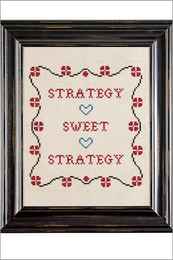

Strategy making forces executives to confront a future they can only guess at. It's not surprising, then, that they try to make the task less daunting by preparing a comprehensive plan for how the company will achieve its goal. But good strategy is not the product of endless research and modeling; it's the result of a simple process of thinking through how to hit a target and whether it's realistic to try. Discomfort is part of the process. If you are entirely comfortable, you're probably stuck in one or more of the following traps. (1) Strategic planning. Planning arguably makes for more thorough budgets, but it must not be confused with strategy. (2) Cost-based thinking. Costs lend themselves wonderfully to planning, because the company controls them. But for revenue, customers are in charge. Planning can't make revenue magically appear. (3) Self-referential strategy frameworks. Even managers who avoid the first two traps may end up using a framework that leads them to design a strategy entirely around what the company controls. A company can avoid those traps by focusing on customers, recognizing that strategy is about making bets, and articulating the logic behind strategic choices.
Product #: R1401F Related Topics: Strategy formulation , Risk management , Customer-centricity ,
Summaries and excerpts of the latest books, special offers, and more from Harvard Business Review Press.